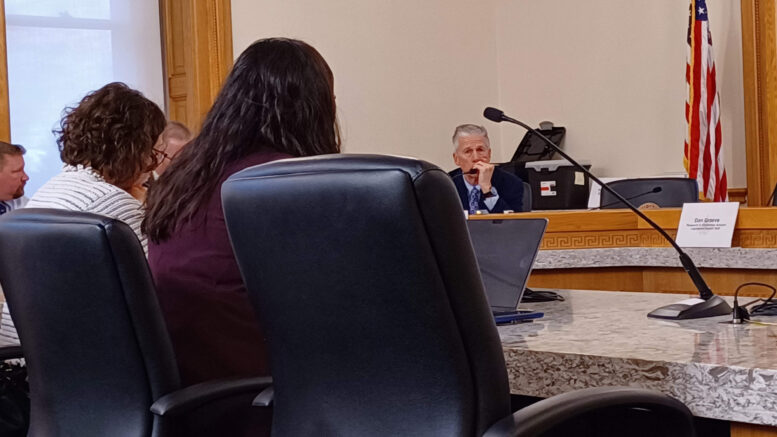Members of a Colorado House committee decisively struck down a bill Thursday that would have upended the ways that restaurants and retailers schedule workers for shifts, saying it could have created significant problems for a restaurant industry that is still trying to recover from myriad coronavirus damages.
The 8-2 defeat of House Bill 1118 in the House Business Affairs and Labor Committee represented the first significant win for business groups in a session in which they expect to be on the defensive often after Democrats captured a record Capitol majority during the 2022 election and boosted the size of the party’s progressive wing. Statements made by several Democrats as they voted to kill the bill indicated that while they continue to look for ways to protect workers against employer excesses, they felt this proposal just went too far.
The Fair Workweek bill, sponsored by Denver Democratic Reps. Emily Sirota and Serena Gonzales-Gutierrez, would have required restaurants, retailers and food-and-beverage manufacturers with at least 250 employees to give workers their schedules two weeks in advance and pay them extra if they sought either to cut or add hours after those postings. It also would have required that employers in those sectors offer part-time workers more hours before hiring new employees to fill open jobs, and it would have penalized employers who retaliated against workers for asserting their new rights to predictive scheduling.
Supporters, including a wide range of worker-advocacy groups, argued that unpredictable scheduling creates financial hardships for workers who can’t depend on the same pay from week to week and makes it difficult to schedule childcare or medical appointments. In a seven-hour hearing on Feb. 16, workers told stories of being required to work six hours beyond their shift parameters, being unable to spend time with their children and facing health issues from long shifts without rests.
But restaurant leaders in particular pressed legislators not to take away the ability to offer flexible scheduling in an industry to which they said people are attracted by the opportunities to swap shifts for reasons ranging from attending parent-teacher conferences to snagging last-minute concert tickets. The Common Sense Institute estimated that the cost of compliance for companies that need to call in workers to cover for sick colleagues or send staff home early in the event of a snowstorm could reach as much as $1 million annually, and a group of 641 servers and bussers sent a letter this week saying such changes would hurt them.
Workers Versus Employers?
Sirota indicated in closing remarks Thursday that several Democrats said they would vote for the bill only if she removed restaurants from its regulations, and she said she was not willing to have employees in that industry treated differently than other service workers. Instead, she and Gonzales-Gutierrez challenged committee members to side with workers over corporate groups that they said were able to hire lobbyists that hourly workers couldn’t afford.
But Democratic Reps. William Lindstedt of Broomfield and Naquetta Ricks of Aurora both said their issue was with the harm the bill could do specifically to restaurants that suffered significant financial losses in the first year-and-a-half of the pandemic and continue to struggle with rising costs and labor shortages. And committee chairwoman Rep. Judy Amabile, D-Boulder, said it was not the work of lobbyists that swayed her but the experience of operating a business for 25 years and understanding the damage that such a one-size-fits-all policy could do both to companies and the workers who rely on them for paychecks.
“When I read this bill, it made me worried that there were unintended consequences, especially to people who we’re trying to help — and that along the way we may do some damage to the restaurant industry that is still recovering,” said Amabile, who joined Lindstedt, Ricks, Democratic Rep. Lindsey Daugherty of Arvada and all committee Republicans in voting it down. “I came to that conclusion on my own. This isn’t a policy I can support right now.”

Colorado state Rep. Judy Amabile, chairwoman of the House Business Affairs and Labor Committee, explains Thursday to sponsors of the Fair Workweek bill why she would oppose it.
Significant Interest
Several committee members said they had been contacted by more people on HB 1118 than they had on any other proposal of this legislative session, showing the passion it engendered specifically among those in the restaurant industry. Rep. Ryan Armosgast, R-Berthoud, estimated that he was getting roughly 100 emails each day from constituents on the topic and that 98 of them were asking for a “no” vote.
Gonzales-Gutierrez argued to committee members about not only the potential benefits to workers — a pool of some 329,000 people, or 13.9% of the Colorado workforce, that it was estimated that HB 1118 would impact — but long-term benefits to business. A Colorado Fiscal Institute study, she noted, predicted that employers eventually could reap $130 million in cost savings by increasing retention of workers in industries with notoriously high turnover rates.
But opponents argued the bill was not something many of the affected workers want and worried that the bill actually would hurt workers. Studies done by CSI of cities where similar laws were implemented found that employers were less willing to allow shift swaps because of new paperwork requirements, scheduled workers for fewer hours for fear of having to pay them to go home and hired less part-time help.
The Colorado Chamber of Commerce, which helped organize a coalition of 65 industry groups against HB 1118, said after the vote that the harsh penalties in the proposal made it “one of the worst bills for business we’ve seen from the Legislature in years” and lauded its defeat. Similarly, the Colorado Restaurant Association said that what made the legislation so bothersome was the fact that the proposed scheduling requirements would have been among the strictest in the country, and the organization said that it was “incredibly relieved.”
“The industry is nowhere near recovered from three years of operational challenges and soaring inflation, and this bill would have irreparably harmed Colorado restaurant workers, consumers and businesses of all sizes,” CRA President & CEO Sonia Riggs said in a statement.
